Ether is the digital currency that powers the Ethereum network, and it plays a crucial role in transactions and smart contracts. You use ether to pay transaction fees, which are measured in gas. As the second-largest cryptocurrency, it attracts investors and supports decentralized applications (dApps). When you stake ether, you contribute to network security but can't spend it during that time. Ether fuels the growth of decentralized finance (DeFi), shaping the future of financial technology. Curious about how ether compares to other cryptocurrencies or how to secure it? There's more to explore beyond the basics.
Key Takeaways
- Ether is the native cryptocurrency of the Ethereum network, primarily used for transaction fees and smart contract execution.
- It can be staked in a proof-of-stake system, enhancing network security through validator accountability.
- Ether fuels decentralized applications (dApps), supporting the growth of decentralized finance (DeFi) and digital ecosystems.
- It is the second-largest cryptocurrency by market capitalization, attracting significant investor interest due to its utility and potential.
- Market volatility and economic influences can significantly impact Ether's value, with regulatory changes and demand levels playing crucial roles.
Ether as Digital Currency

Ether, the native cryptocurrency of the Ethereum network, serves multiple purposes as a digital currency. You can use it to pay transaction fees, measured in gas and denominated in gwei. These fees help prevent network congestion and incentivize validators by burning the base fee and rewarding block proposers with tips.
Additionally, you can stake ether as collateral in the proof-of-stake system, which can't be spent during the staking period. If validators act unethically, they risk losing their staked ether. This system enhances network security by ensuring that validators have a financial incentive to act honestly.
Moreover, ether serves as an investment asset, allowing you to trade it on exchanges or use it for payments at accepting businesses. This versatility makes ether a vital component of the Ethereum ecosystem.
Overview of Ether's Significance

As the backbone of the Ethereum network, ether plays a crucial role in facilitating transactions, powering smart contracts, and supporting decentralized applications.
As the native cryptocurrency, it acts as the "fuel" that drives the Ethereum blockchain, allowing you to pay transaction fees and incentivizing network participants. When you stake ether, you help validate transactions, contributing to the network's security. Its significance extends to being the second-largest virtual currency by market capitalization, attracting investors for trading and speculation. Moreover, ether's versatility enables the execution of smart contracts and the operation of decentralized applications (dApps), making it essential for automation and efficiency in various sectors. This capability to support automated processes is crucial for the growth of decentralized finance and digital ecosystems.
Ultimately, ether's role is pivotal in shaping the future of decentralized finance and digital ecosystems.
Blockchain Transaction Validation Process
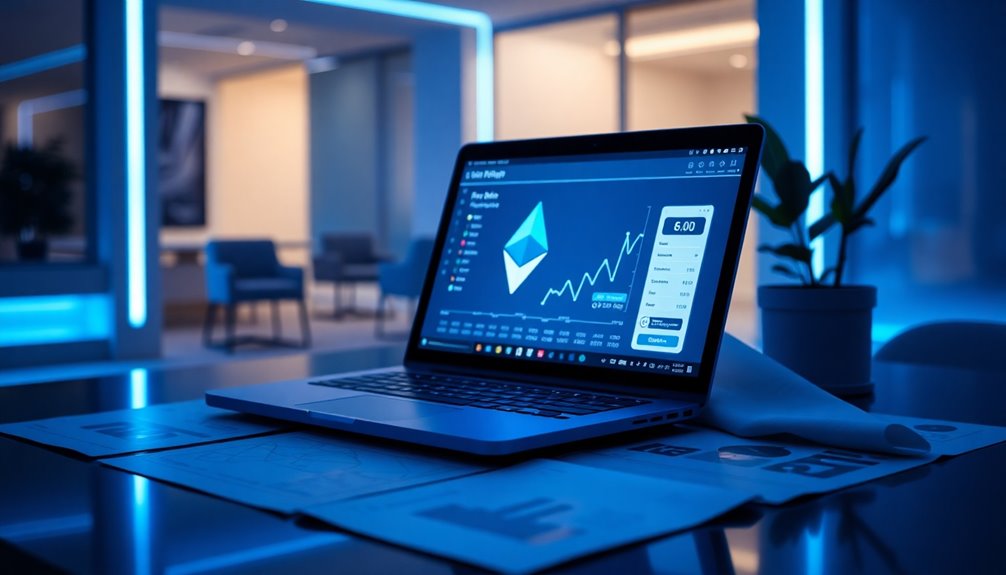
When you initiate a transaction on the Ethereum network, it sets off a detailed validation process that ensures every transaction is legitimate and secure.
First, you create a transaction through your wallet, specifying the amount and recipient's address. You then sign it with your private key, ensuring authenticity, and broadcast the signed transaction to the network.
Nodes receive it, verifying its format and validity before storing it in the mempool. Each node checks that the transaction meets network rules, including balance sufficiency and digital signatures. This process is crucial for maintaining transaction integrity within the decentralized system.
Miners collect transactions from the mempool, solve cryptographic puzzles, and form blocks that are validated and added to the blockchain, confirming your transaction and updating every node's copy of the ledger.
Pros and Cons

While weighing the pros and cons of investing in Ether, you'll find that it offers a unique blend of benefits and challenges.
On the plus side, Ether provides decentralized ownership, giving you control over your funds without interference. Its cryptographic security ensures transaction integrity, making fraud nearly impossible. Ether's utility in powering dApps and supporting DeFi enhances its appeal. Plus, its high liquidity means you can easily buy or sell. Additionally, Ether's position as a leading platform in the blockchain space contributes to its credibility and widespread adoption.
However, scalability issues can lead to congestion and high fees, which might frustrate you. Additionally, concerns about energy consumption linger, even after the transition to proof-of-stake.
Lastly, the lack of a maximum supply raises inflation risks, potentially eroding Ether's value over time.
Ether vs. Bitcoin Performance
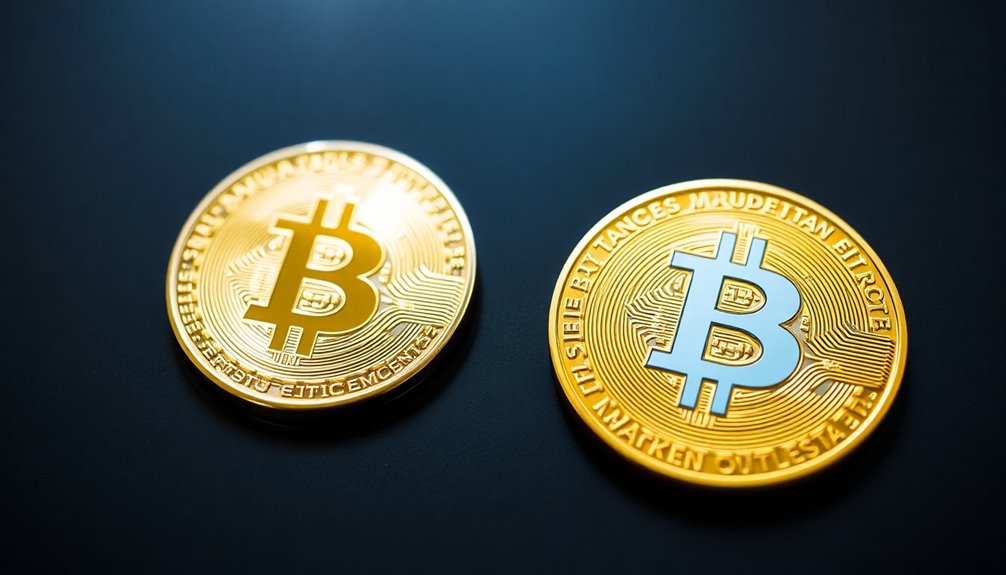
How do Ether and Bitcoin stack up against each other in terms of performance? As the second-largest cryptocurrency, Ether's performance can be gauged using the Ether/BTC price ratio. A rising ratio means Ether is outperforming Bitcoin, while a falling ratio indicates the opposite.
By December 2024, Bitcoin and Ethereum together represent over half of the crypto market, with Ethereum holding its ground. Their correlation coefficient shows how closely their prices move together, with +1 being a perfect correlation. It is important to note that the majority of top tokens are Ethereum-based, which contributes to Ether's significance in the market.
While Bitcoin relies on a Proof-of-Work mechanism, Ether's shift to Proof-of-Stake has made it more energy-efficient and reduced its total supply. This evolution, combined with wider adoption for smart contracts, gives Ether a unique edge in the market.
Market Volatility Concerns
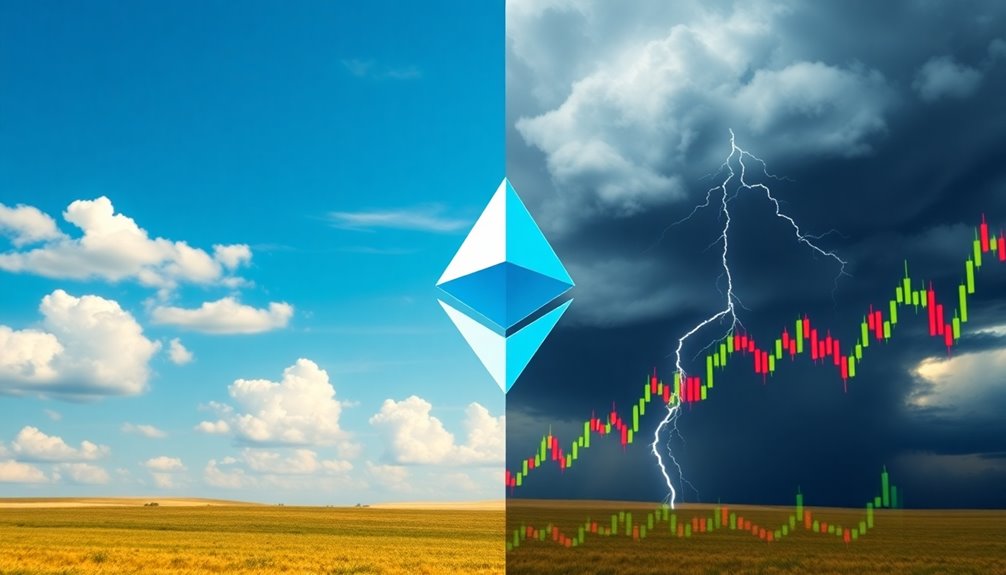
Despite Ether's competitive edge against Bitcoin, market volatility remains a significant concern for investors. Negative news can trigger sell-offs, especially in altcoins, while positive developments might boost prices. Your emotions, driven by fear or greed, can amplify these fluctuations.
When fear, uncertainty, and doubt spread, a herd mentality can lead to rapid price declines. Regulatory changes and economic indicators also play pivotal roles, with uncertainty making investors cautious. Additionally, security breaches or delays in network upgrades can dampen enthusiasm. The concentration of supply among large investors can further manipulate prices, while support levels, like the $3,000 mark for Ethereum, highlight strong demand amidst these fluctuations.
In recent weeks, Ethereum (ETH) has seen a decline exceeding 10% due to market volatility, reflecting shifts in investor sentiment and broader trends in the cryptocurrency landscape.
Understanding these dynamics is crucial for navigating Ether's unpredictable market landscape.
Decentralized Finance (DeFi) Growth
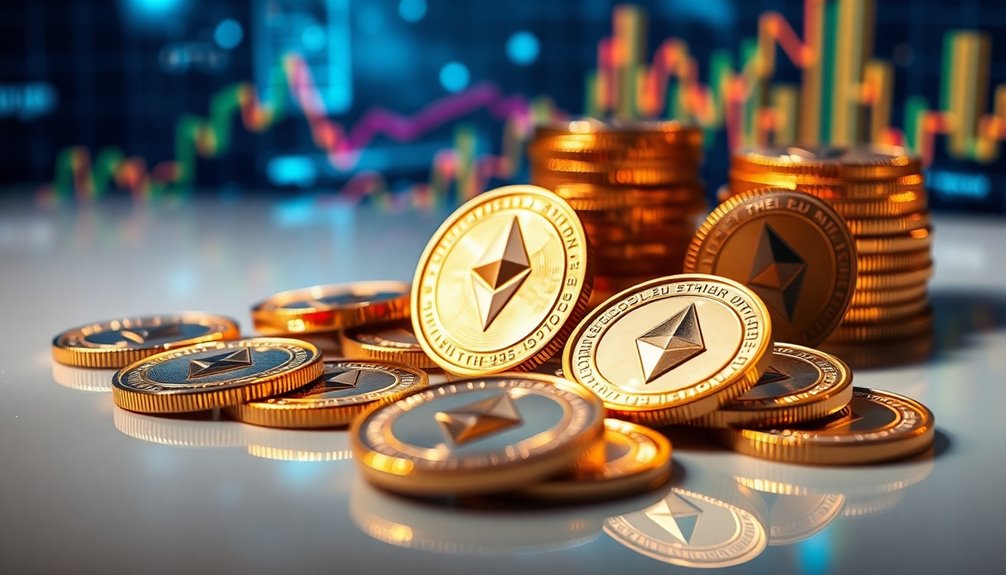
As the DeFi ecosystem continues to expand rapidly, you're likely to see significant opportunities for investment and innovation.
The market's projected growth from $30.07 billion in 2024 to $42.76 billion in 2025, driven by rising cryptocurrency adoption, liquidity mining, and yield farming, highlights this potential. By 2029, it could reach an impressive $178.63 billion. Key trends like cross-chain integration and the popularity of NFTs for collateralizing assets reflect the evolving landscape.
With over 53 million users expected by 2025, decentralized lending, borrowing, and trading services are becoming essential. The total value locked in DeFi platforms surged over five times since July 2020, indicating strong interest and participation, particularly in decentralized exchanges and gaming integrations. Additionally, North America is the largest region in the DeFi market as of 2024, showcasing the geographical dynamics influencing growth.
Secure Your Private Keys
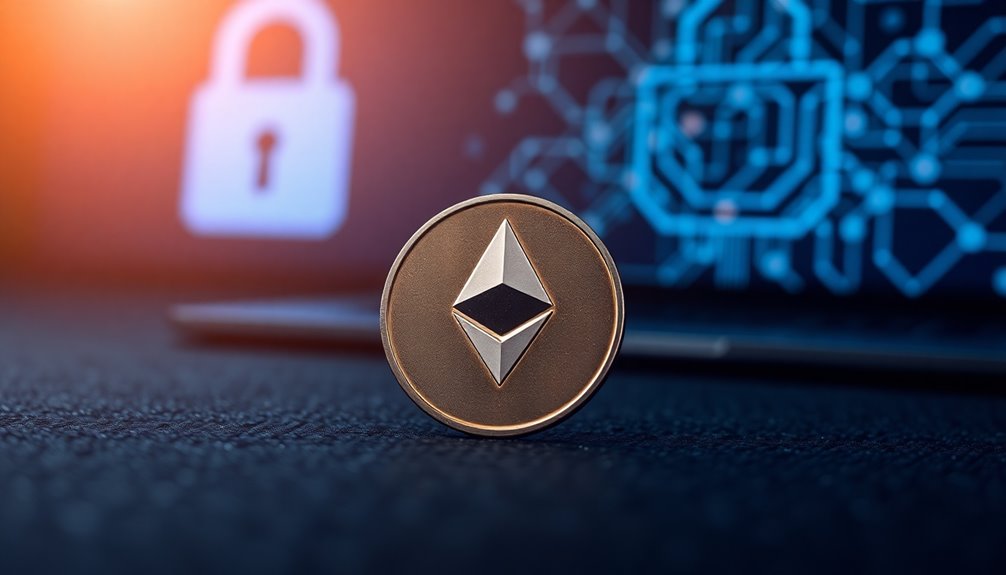
Securing your private keys is crucial for protecting your cryptocurrency assets. You can choose from several secure storage methods.
Hardware wallets, like Ledger and Trezor, keep your keys offline, immune to online attacks. Public keys serve as wallet addresses for receiving funds, but they do not provide access to your assets without the corresponding private keys.
Paper wallets offer a physical storage option, but ensure you print them on high-quality paper and store them securely.
Encrypted USB drives protect your keys with strong encryption, while cold storage keeps them entirely offline.
For advanced security, consider Shamir's Secret Sharing, which splits your key into parts stored in different locations.
Additionally, implementing stringent access policies, like multi-factor authentication, can further safeguard your keys.
Frequently Asked Questions
How Can I Buy Ether Currency Safely?
To buy Ether currency safely, start by selecting a reputable, centralized exchange like Coinbase or Kraken.
Create an account and complete the KYC process. Fund your account using a bank transfer or other payment methods.
Navigate to the trading section, select Ethereum, and enter your desired amount. Review the transaction details, considering any fees.
Once satisfied, execute the purchase. Finally, transfer your Ether to a secure hardware wallet for safekeeping.
What Wallets Support Ether Storage?
When it comes to storing Ether, it's like choosing the right home for your valuables.
You've got several options: Hardware wallets like Trezor Model T offer top-notch security; software wallets such as Exodus provide user-friendly interfaces; and official wallets like Mist integrate seamlessly with Ethereum.
For a simple web-based option, MyEtherWallet allows easy access while supporting hardware wallets.
Each option has its strengths, so pick one that matches your needs best!
Is Ether Mining Still Profitable Today?
Yes, Ether mining can still be profitable today, but it's essential to consider various factors.
You need to monitor Ethereum's network difficulty, which fluctuates based on total mining power.
Electricity costs play a huge role, so keep an eye on your rates.
Additionally, having high-performance mining hardware will help maximize your profits.
Just be aware that market volatility can impact your earnings, so staying informed is crucial for success.
Can Ether Be Used for Everyday Purchases?
Did you know that over 1,500 retailers now accept cryptocurrency?
When it comes to using Ether for everyday purchases, you're in luck! You can shop online at places like Overstock or eGifter, buy luxury items through Crypto Emporium, and even book travel on Travala.
Plus, with peer-to-peer transactions, you can send Ether directly to friends. The options are expanding, making it easier than ever to integrate Ether into your daily spending.
What Are the Tax Implications of Trading Ether?
When you trade Ether, you need to consider the tax implications.
The IRS treats it as property, meaning you'll face capital gains taxes upon sale or exchange if its value has increased. If you hold it for over a year, you might qualify for lower long-term capital gains rates.
If you sell within a year, you'll incur higher short-term rates. Always report your gains and losses accurately on your tax forms.
Conclusion
So, you're all set to dive into the world of Ether, the digital currency that's somehow both a tech marvel and a rollercoaster ride. You've got the blockchain backing it, yet volatility's always lurking around the corner. Isn't it funny how you can feel both excited and terrified by the same thing? Just remember, securing your private keys is like locking your front door—essential, yet somehow we all think it won't happen to us. Happy investing!









